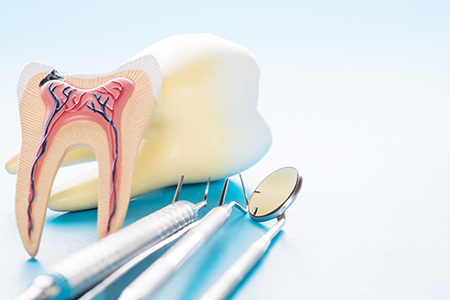
Our Office
652 Middlesex Ave
Metuchen, NJ 08840
Visit Us Online
When a tooth becomes severely damaged due to injury or decay, root canal therapy is often the best way to preserve it and maintain overall oral health.
The office of Metuchen Dentistry offers expert care in performing root canals using modern techniques and advanced technology. Our skilled team provides precise and gentle treatment, ensuring your comfort throughout the procedure.
A root canal is an effective way to save a damaged tooth by removing the infected or inflamed dental pulp. The success rate of this procedure exceeds 90%. By retaining natural teeth, you support overall oral health and general well-being. In contrast, extracting a compromised tooth can lead to further complications such as shifting teeth, bone loss, and issues with chewing and speaking.
Root canals are performed on over 41,000 people daily in the United States alone. This widespread procedure is essential for maintaining natural dentition and preventing potential long-term oral health problems. It ensures that you can continue to enjoy the benefits of a fully functional set of teeth.
The dental pulp, located at the center of each tooth, includes connective tissue, nerves, and blood vessels. These components are crucial during tooth development but become less essential once the tooth has fully grown in. The primary function of the pulp then shifts towards providing nourishment and sensory alertness to the surrounding tissues.
When dental decay or trauma occurs, the pulp can become irreversibly damaged or die, necessitating root canal therapy if enough intact tooth structure remains to support a restoration. This process effectively preserves your natural tooth without requiring extraction.

The need for root canal therapy often manifests through specific warning signs that indicate a compromised dental pulp. If you experience any of the following symptoms, it is crucial to consult with a dental professional promptly:
The severity of symptoms varies depending on the extent of dental pulp damage and nerve involvement. Early detection through regular checkups allows prompt intervention by your dentist, ensuring effective treatment and improved outcomes.

A root canal procedure is typically recommended based on symptoms or findings from a comprehensive oral exam. If you are experiencing pain or discomfort, it's essential to seek dental care without delay. Even in the absence of overt signs, routine examinations can reveal underlying issues requiring prompt attention.
Radiographic evidence of periapical pathology (root end disease) or structural damage detected during regular checkups may necessitate root canal therapy. Early intervention is key to preventing more severe symptoms and complications that could arise from delaying treatment.
Ignoring the need for a root canal can lead to widespread infection, which poses significant risks not only to your oral health but also to overall well-being. The infection can spread to surrounding tissues, causing swelling, pain, and even systemic issues if left untreated.
With modern dental instruments and advanced techniques, undergoing a non-surgical root canal procedure is typically as comfortable as receiving a routine filling. This minimally invasive treatment relieves toothache pain by removing infected or inflamed pulp while preserving the natural structure of your tooth.
The duration of a root canal can vary based on several factors, such as the number and complexity of canals within a tooth, its anatomy, and the presence of an active infection. While some cases may be completed in one visit, others might require two or three appointments to ensure thorough treatment and optimal healing.
During the procedure, your dentist will meticulously remove the diseased dental pulp using specialized tools designed for precision and comfort. After cleaning and disinfecting the internal portion of your tooth, they fill all prepared canals with a biocompatible material that supports long-term stability and function. Local anesthesia is administered to ensure patient comfort throughout the process.

The care and comfort of our patients remain our top priority at Metuchen Dentistry. We are committed to helping you enjoy optimal oral health and providing comprehensive support throughout your treatment journey.
Immediately following your root canal procedure, you may experience lingering numbness due to the local anesthesia used during treatment. It is essential to be cautious until normal sensation returns, typically within an hour or two, to avoid unintentionally biting or injuring sensitive tissues in your mouth such as lips, cheeks, gums, and tongue.
While root canal therapy effectively alleviates toothache pain, some patients may still experience mild discomfort after the anesthesia wears off. This sensation should subside within a few days. Over-the-counter pain medications can help manage any post-procedure soreness. Your dentist will also provide specific instructions tailored to your needs and may prescribe additional medications if necessary.
If an infection is present or there is a risk of developing one, antibiotics might be prescribed as part of your post-treatment care plan. It is crucial to complete the entire course of medication as directed by your dentist to ensure effective treatment and prevent recurrence.
After root canal therapy, it is essential to continue practicing good oral hygiene habits, such as brushing and flossing regularly. Maintaining proper dental care supports healing, prevents further complications, and promotes overall oral health.
A tooth that has undergone a root canal procedure remains vulnerable until a permanent restoration is placed. Temporary fillings provide interim protection but do not offer the same level of strength or durability as a final restoration like a crown. To prevent fractures and ensure long-term success, it is crucial to have your tooth restored promptly.
With proper maintenance and care, a tooth treated with root canal therapy can last for many years, if not indefinitely. Regular dental checkups and follow-ups allow your dentist to monitor the condition of your treated tooth and address any concerns that may arise over time.
At Metuchen Dentistry, our dedicated team is committed to providing exceptional care and support throughout every stage of your dental treatment. From precise diagnosis and gentle procedures to personalized aftercare instructions, we ensure you receive the highest standard of service tailored to your unique needs.
We understand that visiting the dentist can sometimes be stressful, which is why we strive to create a comfortable and welcoming environment for all our patients. Our state-of-the-art facilities and compassionate approach help alleviate anxiety associated with dental visits.
If you have any additional questions or concerns regarding root canal therapy or experience ongoing discomfort following your procedure, please do not hesitate to reach out to the office of Metuchen Dentistry. Our team is here to support you every step of the way, ensuring optimal oral health and a confident smile that lasts a lifetime.
A root canal procedure is the best way to save a tooth that has been damaged by decay or injury and preserve your natural smile. The alternative is an extraction and treatment to replace the tooth. While at times a tooth is non-restorable and an extraction is the only option, when possible, it’s best to try and save your natural tooth. With proper care, a tooth with root canal therapy can serve your smile well for many years to come.
Despite lingering myths from before the age of modern dental anesthesia and technology, having a root canal procedure today is as routine and comfortable as visiting the dentist for a filling. While the procedure is performed under local anesthesia with your tooth completely numbed, we can also discuss options in dental sedation.
Whether the symptoms of a dental infection subside after a course of antibiotics, a draining abscess provides you with some temporary pain relief, or a tooth with radiographic evidence of pathology has not yet developed symptoms, it’s essential, before an infection worsens or occurs, to have a root canal procedure performed. In this way, the tooth can be disinfected, filled, and sealed to protect your health and avoid further problems.
If you have sustained a dental injury, have a toothache, jaw pain, swelling, or are experiencing any other unusual and uncomfortable oral symptoms, contact our office immediately for care. Dental problems that have not been evaluated and treated can significantly worsen, producing more severe damage and consequences for the involved teeth, your oral health, and even your overall wellbeing. Once you get in touch with our office, our friendly and compassionate office team will get you in for care at your earliest convenience.
While some root canal procedures can be completed in one visit, others may involve 2 or 3 appointments. How long it takes depends on various factors, including active infection, the number of canals in the tooth, and the tooth’s location or anatomy.
With a success rate that exceeds 95%, root canal therapy remains the most effective procedure to save a tooth in which the inner vital tissues have been damaged. However, as with all healthcare procedures, there are a small percentage of cases where the teeth become symptomatic a second time. The good news is that many of these teeth can still be saved with root canal retreatment or a minor surgical procedure known as an apicoectomy.
The best ways to maintain a tooth with root canal therapy are to get the proper restoration required to rebuild and protect the tooth, maintain proper oral hygiene, and schedule appointments for routine dental checkups and care.
Saving a tooth with root canal therapy is a wise investment that, in the long run, is typically less costly and invasive than having the tooth extracted and replaced with a fixed bridge or implant. As far as the exact cost of care, it can vary depending on which tooth is being treated. Many dental insurance plans provide coverage for root canal therapy. At the office of Metuchen Dentistry, we do our best to optimize your dental benefits and minimize your out-of-pocket expenses. Our staff will answer all your questions about the cost of care and discuss all your payment options.
At the office of Metuchen Dentistry, we use the latest technology and most effective methods of care to provide precise and gentle care. Our reputation for excellence is based upon a consistent record of achieving successful treatment outcomes while providing prompt, stress-free, and convenient treatment for every type of dental need.
